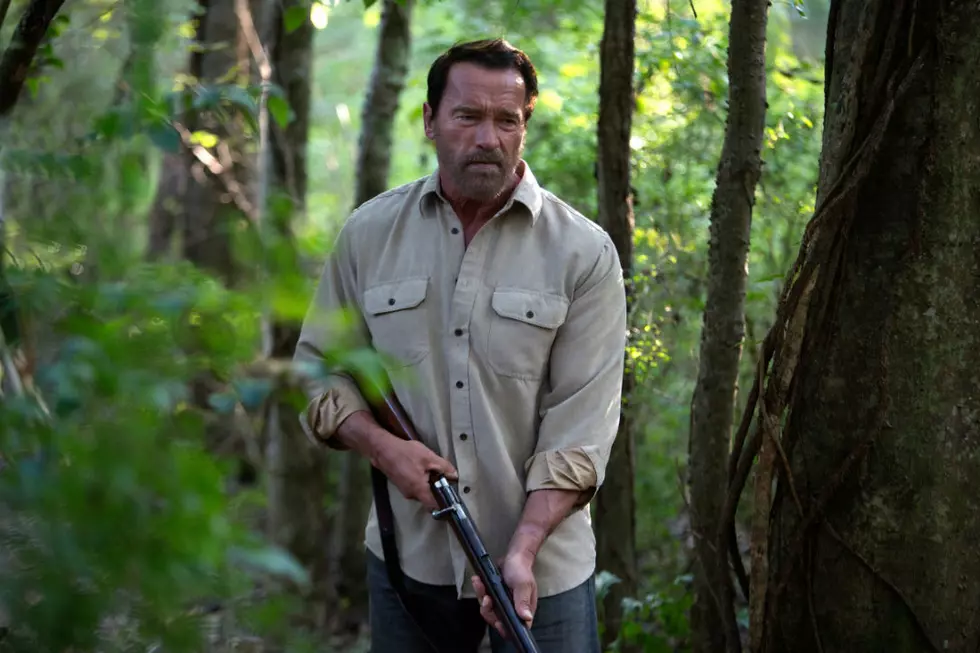
Arnold Schwarzenegger Is Making the Most Interesting Movies of His Career Right Now
As a box-office draw, Arnold Schwarzenegger’s best years were from the late 1980s through the mid 1990s. That overlaps significantly with his biggest years as an action hero, from 1984’s The Terminator to 1994’s True Lies.
If you wanted to pick Schwarzenegger’s “best” movie, you would almost certainly name something from that era; probably one of the first two Terminators, Predator, or Total Recall. And it’s almost impossible to argue that Schwarzenegger’s biggest days as an action star or marquee talent are behind him. But Schwarzenegger’s most interesting movies — the most serious and thoughtful about his onscreen persona and the ideas that bubbled below the surface of his more popular hits — are the ones he’s making right now in 2017.
The latest example is Aftermath, which opens in theaters and on VOD this week. Schwarzenegger plays Roman, a humble construction manager whose family dies in a tragic mid-air plane collision. Roman blames the air traffic controller in charge at the time of the accident, played by Scoot McNairy, but he’s cleared by the official investigation. The fallout of this tragedy destroys both of their lives, and leads to a fateful meeting between the two.
A familiarity with the Schwarzenegger oeuvre would lead you to assume that this conflict builds to some enormous outburst of cathartic violence, with Schwarzenegger playing the role of the aggrieved avenger. It doesn’t. Without spoiling the film’s final act, when blood is shed there’s nothing cool or choreographed about it. Nor is Schwarzenegger’s Roman a moral righter of wrongs. He’s a broken man. Aftermath isn’t an action movie. It’s a tragedy about how easily we can lose sight of ourselves when we lose the people in our lives who are most precious to us.
Roman, and most of the other characters Schwarzenegger has played in the last three years, stand in stark contrast to the ones that made him an icon. The classic Arnold didn’t just laugh in the face of death, he openly mocked it. The new Arnold, weathered by years of experience and informed by personal loss, hardly ever cracks jokes onscreen. The old Ahnuld could single-handedly kill dozens of men without breaking a sweat. The new Arnold often can’t bring himself to kill a single person. As I wrote in a review of his 2014 movie Sabotage, which may be the single most interesting film of this particularly compelling period of Schwarzenegger’s career, he’s gone from playing the Terminator to playing the terminally depressed.
When I interviewed Schwarzenegger earlier this week, he insisted the themes that pop up over and over in these movies were not chosen deliberately. “It’s not so much that it interests me,” he said when I asked why so many of his recent movies are about death and failure. “What interests me is to do something different that I have not done before.”
To some extent, that is true; Schwarzenegger has never made a movie as subdued, introspective, and sad as Aftermath. But he has made a version of this story before, almost exactly. In fact, a lot of these recent movies have curious echoes of old Schwarzenegger hits — and that’s what makes them so fascinating.
Take Aftermath, for example. Again, the Schwarzenegger character’s ineffectual nature is unique. But the premise — a blue-collar guy’s family is killed, the guy swears revenge — is nearly identical to 2002’s Collateral Damage, in which Schwarzenegger plays a firefighter whose wife and son are murdered in a terrorist attack. The difference is only in how Schwarzenegger reacts to this loss. In Aftermath, Roman is paralyzed with grief. In Collateral Damage, Arnold’s Gordy Brewer springs into action, sneaks into Colombia, and eventually kills the terrorist responsible. He’s devastated by the deaths of his wife and son, but not so devastated that he can’t still squeeze in a one-liner before killing his enemy by throwing an axe through his chest.
Schwarzenegger plays a similarly devastated widower in Sabotage. In that film, he’s DEA agent John “Breacher” Wharton, who heads an elite team of undercover agents. They steal $10 million from a drug cartel, but the money goes missing, and a few months later, after the government’s investigation into the missing cash is closed, the members of Breacher’s crew begin dying one by one. The plot is a modern variation of an old Agatha Christie whodunit, except the end of Sabotage reveals the entire story as a giant MacGuffin. The people responsible for the murders of Schwarzenegger’s men were not the same ones who stole the drug money because (SPOILER ALERT) Schwarzenegger himself was the one who took the money, in order to exact revenge on the men from the cartel who had murdered his wife and son years earlier.
The film is rife with subtle Arnold callbacks. Breacher’s house, for instance, is a lavish and rustic mansion on a lake.
It seems way above a DEA agent’s pay grade. But it strongly resembles the palatial cabin he shared with Alyssa Milano in Commando, happily chopping wood and feeding deer.
Commando is one of Schwarzenegger’s most absurd (and entertaining) action films; the Milano character is kidnapped by a South American dictator who wants to blackmail Schwarzenegger’s John Matrix into performing an assassination on his behalf. Matrix pretends to go along, then sneaks away from his handlers and makes his way to the dictator’s island compound, where he slaughters approximately 2,000 men without sustaining a single meaningful injury.
Sabotage is like the same movie reset in the Bizarro Universe. This time, Schwarzenegger doesn’t save his loved ones. Instead, the cartel mails pieces of them back to him, and he spends his free time watching videos of their torture and murder on his computer. Even with all its violence (and in many ways because of its violence) Commando is escapist fun. (This is the movie where Schwarzenegger throws a pipe through a guy into a boiler, and as steam pours out of the pipe Arnold quips, “Let off some steam.”) The violence in Sabotage, which was directed by Suicide Squad’s David Ayer, is so graphic it’s borderline repulsive.
In the film’s powerful epilogue, Breacher uses the stolen drug money to bribe a corrupt cop into revealing the identities of the men who killed his family. He tracks them to a bar and starts shooting. (Again, there are SPOILERS below.)
There are numerous key Arnold signifiers in the scene, including the big stogie he lights after the gunfire dies down. (The fight in the bathroom is also smaller-scale callback to a similar scene in True Lies.) Though Breacher suffers seemingly fatal injuries, he never reacts with pain or shock; he only registers the wounds after everyone else is dead, like a flesh and blood version of his old Terminator.
Sabotage ends right there, with the implication that Breacher died shortly thereafter, content in the knowledge that he at least got his revenge. The viewer, though, is left to consider the bloody cost of that vengeance, which includes Breacher’s entire team and several innocent bystanders in the Mexican bar where the final confrontation takes place. There’s an even darker tinge to the finales of Maggie, where Schwarzenegger must decide whether or not to kill his daughter before she turns into a zombie, and Aftermath, with the fallout of the confrontation between Schwarzenegger and McNairy.
Schwarzenegger can claim that all of these movies have risen from a desire to try new acting challenges, and that is surely part of it. But taken as a whole, these projects also amount to a blistering act of self-critique, not just of Schwarzenegger’s past films and roles and their blithe attitude toward murder and vigilante justice, but his own past life choices as well.
Schwarzenegger’s return to full-time acting came about two years after the dissolution of his 25-year marriage to Maria Shriver. Though he spent most of the 1990s playing happy husbands and dads (who were still also awesome action dudes), he’s spent most of his comeback playing men paralyzed by the loss of their families. There are weird parallels, too; his Sabotage character is nicknamed Breacher because of his penchant for busting down doors during drug raids. But someone who cheats on his wife could be described as a breacher of the rules of their marriage.
It’s possible this is all just a giant coincidence. It’s conceivable that while Schwarzenegger has publicly stated that he’s “least proud of the mistakes I made that caused my family pain and split us up,” that has absolutely nothing to do with the fact that he keeps selecting roles that cast him as men punishing themselves for the collapse of their personal lives. That would a pretty big coincidence, though.
Viewed as a whole, these movies appear to represent a man at war with his worst impulses. If I told you that there was a scene in Terminator Genisys where Schwarzenegger was literally at war with his worst impulses, would you believe me? Because it definitely happened.
No one would confuse Genisys with The Terminator or T2 in terms of quality, and some scenes in it did play like glossy fan fiction. Still, critics and audiences who dismissed it as a shallow rehash missed the subtext about Arnold’s evolving onscreen persona. He’s not making the best movies of his career, but by grappling with the aftermath of what he’s made and what he’s done, he’s giving his best performances.
Every Arnold Schwarzenegger Movie, Ranked From Worst to Best










